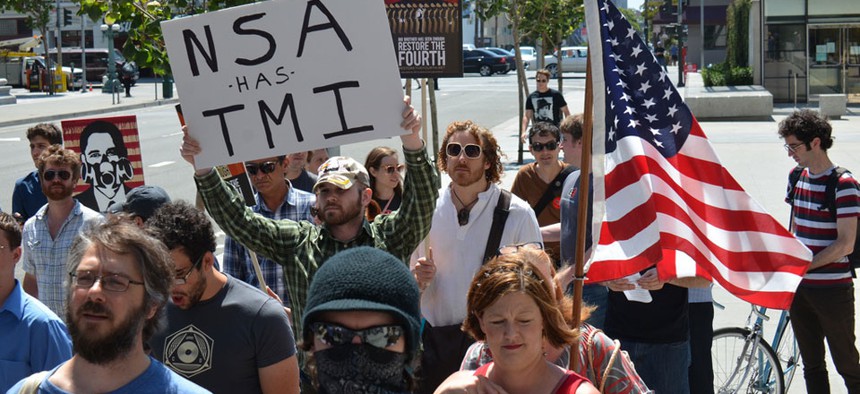
Protestors gathered at in San Francisco on July 4. Flickr user ari
America Is Split by the NSA, but Not Along the Usual Partisan Lines
Both parties sharply divided over data-mining revelations, Pew finds.
Something strangely refreshing about the way the National Security Agency data-mining revelations have played out is how it has blurred the usual partisan divides. This was especially apparent Wednesday, when the House voted on an amendment to defund the NSA's spying apparatus. It was Republican-led, but backed by some Democrats. A strange grouping—including the White House; Rep. Michele Bachmann, R-Minn.; and Sen. Dianne Feinstein, D-Calif.—all spoke out against the measure. It lost by a slim margin, 205-217 (94 Republicans and 111 Democrats backed the amendment).
That partisan fuzziness on the Hill is also reflected in the general population, as new polling from Pew indicates. Both parties are split on the issue: 50 percent of Republicans disapprove of the program, agreeing with 36 percent of Democrats and 48 percent of independents. What appears to be growing overall is a libertarian mindset on the issue. "This is the first time in Pew Research polling that more have expressed concern over civil liberties than protection from terrorism since the question was first asked in 2004," the report states. Since 2010, the percent of Republicans who feel the government has gone "too far" in restricting civil liberties jumped from 25 percent to 43 percent (Democrats jumped as well, from 33 percent to 42 percent.) The polling also is indicative of a growing intellectual riff in the Republican Party between libertarians and traditional conservatives. And New Jersey Gov. Chris Christie isn't a fan, saying on Thursday, "This strain of libertarianism that's going through parties right now and making big headlines I think is a very dangerous thought." Christie specifically mentioned Sen. Rand Paul, R-Ky., as one of the people with such thoughts. "Do we have amnesia? Because I don't," he continued. "And I remember what we felt like on September 12, 2001."
Another thing the Pew poll captures: paranoia. From the survey of 1,480 adults, we learn that:
-
27 percent believe that the government has been listening to their phone calls and reading their online correspondence, which is something the president has stressed doesn't happen without a FISA court order.
- But more striking is a full 70 percent of respondents don't believe that this is all in the name of preventing terrorism, saying that the government "uses this data for purposes other than investigating terrorism"—including 2 percent of respondents who think the government is selling the data for marketing purposes.
(Image via Flickr user ari)







